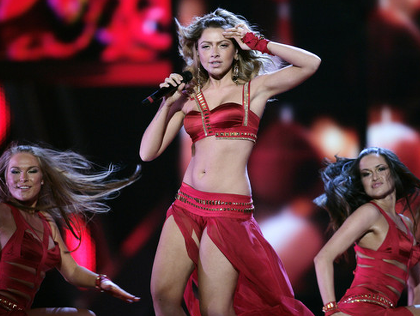
Tonight, tens of millions of Europeans will go to the polls to make one of the most important decisions facing the continent: who will win this year’s Eurovision Song Contest?
For those who are unfamiliar with how it works, every country who is a member of the European Broadcast Union enters a song that falls into one of these categories: really camp, utterly dreadful or completely weird.
Then thirty-two countries compete in the semi-finals to go through to the final, which is tonight. They are joined in the final by the “Big 5” countries who pay so much to broadcast Eurovision that if they pulled out the competition would have to be abolished (UK, Germany, France, Spain and Italy) and the host country.
On Eurovision night the twenty-six finalists will all perform their songs to a studio audience of 11,000 on Eurovision Island (previously known as the Burmeister and Wain Shipyard) in Copenhagen, Denmark. At the end people get to vote for their favourite, and when the results are tallied up each country awards points ranging from 1 to 10. They then award 12 points to their favourite.
When the polls open almost everyone outside the gay community will completely ignore what the song was like and vote for a country they have an affinity to. As an example, the largest ethnic minority grouping in Germany is Turkish, and so unsurprisingly Germany often gives twelve points to Turkey.
There are two Greek Orthodox countries in the competition: Cyprus and Greece, and by some miracle they also tend to vote for each other. Then there is the famous ‘Baltic Bloc’ of Estonia, Latvia and Lithuania who also rarely give top marks to anyone but each other.
Then there is the ‘Viking Empire’: Sweden, Norway, Finland, Denmark, and Iceland. United by their cold weather, shared history, and a love of high tax on alcohol they still tend to stick together on Eurovision night.
But tactical voting cuts both ways. One of this year’s favourites to win is Aram MP3 from Armenia, his nod to dub-step music has been popular across the continent. But no matter what he does, he will not get any votes from neighbouring Azerbaijan. One year they cut the broadcast when Armenia was on, and another year Azeri police reportedly arrested and questioned everyone who called in to vote for their neighbour and rival. They lost a war with Armenia in 1994 and are still not happy about it!
Similarly, no matter how good the United Kingdom’s entry is no-one ever votes for it. It’s been years since the UK came anywhere near winning, and since the war on Iraq the country has done embarrassingly badly almost every year.
In order to stem the tactical voting each country now has a jury of experts. The final result is half phone vote and half expert opinion: this injects a competitive element to it. In the days of 100 percent phone voting, anyone with an interest in psephology could predict the winner without listening to any of the songs!
At Tuesday’s semi-final Ukraine went up against Russia and whilst both got through to the final there was no love for Russia in Copenhagen. The country is being represented by the Tolmachevy Sisters, 17-year-old twins who sing whilst bouncing up and down on alternative ends of a see-saw (yes it does look strange). When the announcement came that they had got through to the final there was audible booing by the audience, in contrast to the ecstatic support for Ukraine.
Of course with all this tactical voting, glitter and bizarre dance routines it is easy to write off the Eurovision Song Contest as a complete joke. But there is a serious side to it.
With 180 million viewers it is one of the biggest talent shows in the world and for small countries it may be the only time they get to say anything about themselves to the whole of Europe.
A win at Eurovision is sought after by smaller countries because it comes with a huge public relations prize: the right to host the competition the following year. For countries that most Europeans know very little about like, for example Moldova, winning three and a half hours of prime time Saturday night television live from your country and beamed to 45 others is a seriously worthwhile prize.
Tonight as ever the Brits will all tune in hoping that our song does not come last despite being easily the best. Sadly our hopes will probably be dashed. Europeans just don’t like us enough to support us… I hear David Cameron’s having similar problems!
P.S. In 2009 Georgia entered this song (below), shortly after part of their territory was invaded by Russia.
The song is about a boring person who gatecrashes parties and ruins the mood (something they called a ‘Put In’).
They had to pull out even though they denied the song was about the Russian President. The video is below so you can decide:

COMMENTS
Please let us know if you're having issues with commenting.